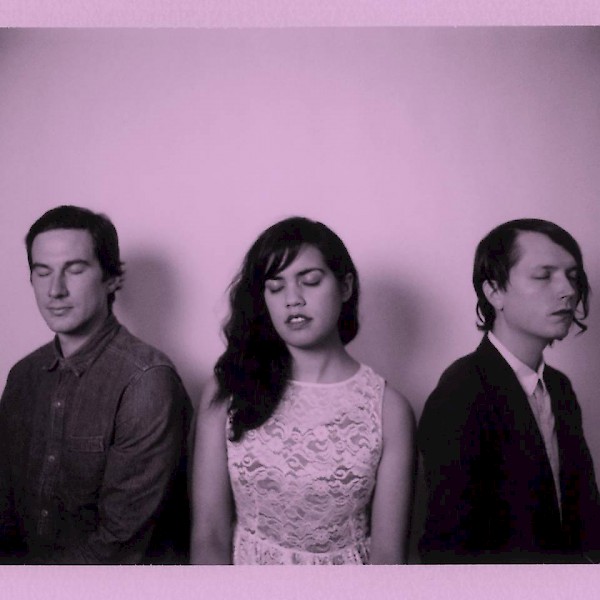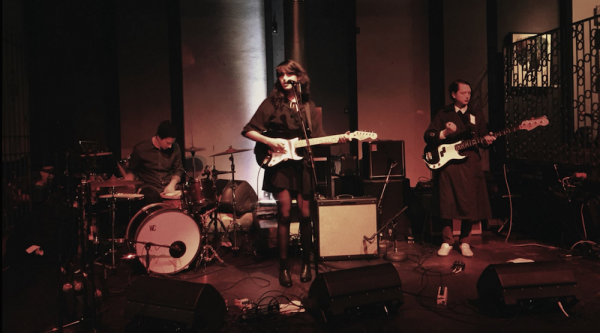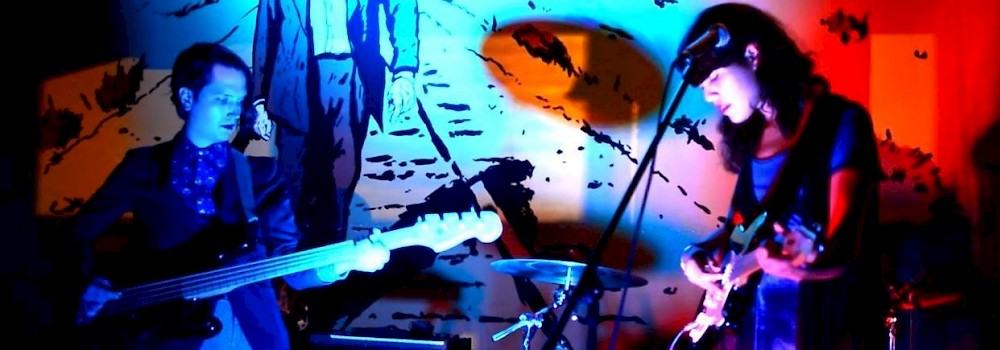 Haste, from left to right: Kaleb Shields, Jasmine Wood and Thomas HogansonMost bars on Mississippi Avenue were overly crowded at the start of the night. After scoping out what little space was available at both Liberty Bell and Moloko, we settled on meeting at Beech Street Parlor. The members of Haste are already at the bar with drinks in hand by the time I saunter in.
Haste, from left to right: Kaleb Shields, Jasmine Wood and Thomas HogansonMost bars on Mississippi Avenue were overly crowded at the start of the night. After scoping out what little space was available at both Liberty Bell and Moloko, we settled on meeting at Beech Street Parlor. The members of Haste are already at the bar with drinks in hand by the time I saunter in.
Jasmine Wood, vocalist and christened bandleader, rushes up to me in an excited flurry of thank yous and welcomes, twinkling with an obvious, excitable energy. She introduces me to the other two members of the band: Kaleb Shields, drummer, casually standing against a stool sipping an IPA, and Thomas Hoganson, bassist, waiting for the bartender to serve his drink.
Once everyone is served, we walk upstairs to see if any of the private rooms are available, but to no avail. Eventually something opens up and we swoop upon a table conveniently close to the bar.
Settling in with our drinks, Wood immediately opens up. “Haste is actually my first band,” she says. “I started the project in 2012 and began playing with Kaleb [in summer 2015] and Thomas started playing with us a few months afterward. It was a rotating cast of people before then.”
Currently, Haste have two releases, available exclusively through Bandcamp: Let’s Touch Ourselves (2012) and I Carried Rocks From The Water (2015).
“I wrote the songs alone, but I didn’t record I Carried Rocks From The Water by myself. My friends helped. My old roommate [Elaina Tardif] was playing bass, and my friend Jesse Carson (of the band Midland) was on drums. Jason Powers at Type Foundry Studios mixed and mastered the songs. It took about a year for me to finish the EP because I sat on it for such a long time,” she almost asks this, as if she’s questioning why she chose to wait. Laughing, she continues, “It’s a different band on the EP, but [Shields and Hoganson] are going to be on the next release though!”
When asked about any forthcoming releases, she pauses, “I’m still writing [our album]. We recorded some demos at Thomas’ house that we’re pretty happy about, but I want to write more.”
We dive into the directions Wood may want to explore in crafting this album and what’s influencing her during the songwriting process, but Shields makes light of the situation instead. “Jasmine is really into the new Mumford & Sons record and how they went full band on that last album.”
 After a few second of silence, Hoganson chimes in to continue the change in conversation. “Yeah, we’re basically just stomping and clapping the whole time,” he smirks.
After a few second of silence, Hoganson chimes in to continue the change in conversation. “Yeah, we’re basically just stomping and clapping the whole time,” he smirks.
“It’s all she’ll let me play on drums,” Shields replies, trying to mimic the beat of a generic Mumford & Sons song on the table with his hands.
Wood laughs, deflecting their teasing. “It’s a lot different than my last EP. At least, so far anyway. I barely sing on it.” She stops to remember what she was originally asked. “Oh, influences. I like Grouper’s side project, Helen, a lot. So we’re aiming to sound much more shoegaze than anything else Haste has released.”
Hoganson adds, “The Boss DD-5 [delay pedal] is a huge influence, too.”
“Yes, thank you! I’m using a delay pedal now and I wasn’t before,” Wood says. “Now I’m just writing songs all the time whereas before it’d take me so long to finish just one, partially because of that. I had just never used one before and it sounds so good. I just want to use [the delay pedal] all the time. One thing I did consciously think about going into this album is that I’d want to play guitar more and sing less. It’s been working out. Moments I’d step away from the mic, you know, and it’s so much more fun that way. It’s very different from my previous releases.”
The conversation shifts from the album to the possibility of playing more live shows. Thinking about the changes she’s experienced since the genesis of her project, she adds, “I’m stepping away and paying more attention to my playing, but I’m still learning [my stage presence]. I haven’t started dancing around yet...” Wood trails off.
“We really need to work on our choreography,” Hoganson interrupts.
Shields fakes a serious tone. “She needs to learn not to jump up on the kick drum.”
Wood belts out a laugh. “I don’t know if that’s really our style,” she finally responds.
At this point, our drinks are already nearing their end and everyone at the table begins to open up. Suddenly, Hoganson perks up and beams just as Rick Astley’s “Never Gonna Give You Up” starts playing through the parlor’s speakers. “Can we just stop the interview and listen to this song for a second? Like, a moment of appreciation. It’s just so good,” he quips, dancing slightly in his chair. This announcement, being so unexpected, causes the group to break out in laughter.
Eventually, as Beech Street Parlor gains more customers and the night moves forward, our conversation strays from the band’s work to another somewhat unrelated topic: Portland’s increasing popularity and the subsequent struggle with housing, and how these issues may affect members of the city’s music community.
 Haste live at Rontoms“I’m from Portland,” Wood says. She stops herself as an attempt to sound positive, knowing the animosity felt toward the people moving to the city en masse. “I mean, no one is technically from Portland, that I know of.”
Haste live at Rontoms“I’m from Portland,” Wood says. She stops herself as an attempt to sound positive, knowing the animosity felt toward the people moving to the city en masse. “I mean, no one is technically from Portland, that I know of.”
“I’m not originally from Portland, but I’ve been here since 2004.” Hoganson adds. He continues, with a rather vague intonation, “I’m from far away.”
“I moved here in 2008... from Alaska,” Shields says.
Eager, Hoganson describes his first impressions of Portland’s music scene. “In the beginning, it was incredibly difficult to connect with any kind of music community. I was really young then, so I didn’t know anything about having a show, but eventually I started going to house shows. I even had a house show venue and met people through that kind of thing. But, I don’t know, once you get into it, it’s really easy to find like-minded people [who are] into the same kind of stuff that you’re into. Back then, Portland had an amazing punk and house show scene. It was great. It’s terrible now.”
“It’s almost nonexistent these days,” Wood says.
Nodding, Hoganson continues. “Yeah, people just aren’t doing a lot of that kind of DIY stuff anymore. It’ll always exist, but it used to be crazy.”
“My only experience in booking shows has been through Beacon Sound, where I work, but we can’t host shows anymore because of surrounding noise complaints,” Wood says, illustrating the subtle changes taking place in Portland’s more artistically driven neighborhoods. “There aren’t a lot of places that remain open or continue that kind of thing. People are trying and there’s always cool stuff happening, but it’s not getting anywhere.”
“To further that point, I’m getting kicked out of my house because we play music at that house,” Shields adds. “It’s right off of Mississippi, near Beacon Sound, and we’re very respectful of the quiet hours and always adhere to them.”
“People move in and they live next to a venue because they love culture and music, but they also hate noise. So, it’s a really weird kind of paradox,” Hoganson says.
Wood takes a more uplifting route, although she refrains from disagreeing with her bandmates. “I try to feel positive about all this, which is why I started booking shows at Beacon Sound. We didn’t have shows there before and I’d like to think that there’s a possibility of keeping that community with all the people moving here, but it really does take patience.” She stops to linger over her words. “I like the idea that the city is changing, but I don’t know how it’ll be in the long term. I mean, we got a letter from the city saying they were going to evict us from the space if we continued these shows. We had really quiet shows for the most part and they all ended by 11pm. It’s unfortunate—we had to cancel a bunch of stuff that we were really excited about. We were doing small electronic shows, but basically I have to go around door-to-door and warn neighbors now.”
“It really is unfortunate,” Shields agrees. “There are a lot of people moving here. There are homeowners living to the left and right of [my home], and they chose to come and live in a place in the city where there’s going to be music playing. If you want a quiet neighborhood, move out to the suburbs.”
 “They’re bringing the suburbs to you,” Hoganson sighs.
“They’re bringing the suburbs to you,” Hoganson sighs.
“I moved into this house in late 2011, so I’ve been there awhile. It’s really convenient to have your practice space in your own house, just throwing that out there, but I do respect the quiet hours. You can make so many decibels between this and this hour, but then you cut it off. That’s what we’ve done, cutting it off around 9pm. We got a letter in the mail saying we’re not evicted but we have to move it, and by law, they don’t have to give any reason. We weren’t even warned about this being an issue beforehand. We were month to month. So, Haste is going to have to practice somewhere else.”
Excitedly, Wood adds, “We’re practicing at Thomas’ house!”
“Which is fine because I live next to two soccer frats and they’re way louder than we are. We can be as loud as we want to,” Hoganson says, trying to sound more positive about the situation. “So, it’s fine.”
Speaking of practice, the band quickly turns to a discussion of how they may go about their next practice. Wood turns to me and fills me in on how they communicate throughout the day. “It’s easy, we make time. I try to fit things in wherever possible because we’re all doing other stuff. We’re all mutually excited, but I’m the initiator and usually I’m talking on the group chat more than everyone and sending GIFs. I like to send a lot of GIFs, that’s how I usually express myself.”
“Jasmine is the best when it comes to sending messages to the band,” Shields adds.
“I have this group message thing with Kaleb and Thomas that I use… a lot,” Wood admits, suddenly growing bashful. “Sometimes, I’m not sober and there’s too much typing involved.”
Hoganson laughs. “Lack of communication is definitely not an issue.”
“That’s a very positive way of putting it,” Wood rolls her eyes. “Normally I’m not this organized. We cancel stuff all the time. Sometimes even an hour before on the day of, we’ll cancel. Including me! No one’s being a jerk or anything.”
“We’re all very relaxed people,” Hoganson replies.
“Yeah, tonight’s the only time we’ve come early on purpose,” Wood jokes.
Hoganson shrugs, before getting up to head back to the bar for a new drink. “We gotta put the punk in punctual.”





